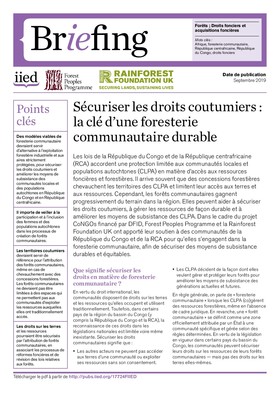Focal point
Location
Mission
Our mission is to build a fairer, more sustainable world, using evidence, action and influence in partnership with others.
Who we are
IIED is one of the world’s most influential international development and environment policy research organisations. Founded in 1971 by economist Barbara Ward, who forged the concept and cause of sustainable development, we work with partners on five continents. We build bridges between policy and practice, rich and poor communities, the government and private sector, and across diverse interest groups. We contribute to many international policy processes and frameworks, including the Intergovernmental Panel on Climate Change, the Millennium Ecosystem Assessment and the UN conventions on climate change and biological diversity.
What we do
IIED carries out research, advice and advocacy work. We carry out action research — generating robust evidence and know-how that is informed by a practical perspective acquired through hands-on research with grassroots partners — and we publish in journals and maintain high research standards. We advise government, business and development agencies, and we argue for changes in public policy. We focus on bottom-up solutions, stay open to flexible, adaptable solutions and are marked by a tradition of challenging conventional wisdom through original thinking.
Resources
Displaying 56 - 60 of 367Sécuriser les droits coutumiers : la clé d’une foresterie communautaire durable
Les lois de la République du Congo et de la République centrafricaine (RCA) accordent une protection limitée aux communautés locales et populations autochtones (CLPA) en matière d’accès aux ressources foncières et forestières. Il arrive souvent que des concessions forestières chevauchent les territoires des CLPA et limitent leur accès aux terres et aux ressources. Cependant, les forêts communautaires gagnent progressivement du terrain dans la région.
Making their voices count: the African women protecting their land rights
New public policies and changing economic fundamentals have spurred private sector investment in commercial agriculture in low- and middle-income countries. Growing numbers of policies and programmes aim to integrate small-scale rural producers into agricultural value chains;based on concepts such as ‘inclusive businessand ‘shared value’.
A stronger voice for women in local land governance: effective approaches in Tanzania;Ghana and Senegal
This report;based on primary and secondary data;highlights the link between land and inequality in Uganda. It underscores the need to review policies;laws and regulations governing institutions and practices in the realm of land ownership;access;use and management;and to allocate enough resources to secure land rights. The report looks at factors that have had an impact on poverty and vulnerability;and how policies;laws;regulations and cultural practices can be made more inclusive.
How local rules can promote inclusive land governance in Tanzania
Combining both written analysis and video interviews;this ‘longreaddetails the impacts on women’s lives of three approaches developed by IIED partners in Tanzania;Ghana and Senegal to reinforce land governance structure in rural communities to make them gender-inclusive.
Apes;crops and communities: land concessions and conservation in Cameroon
Argues that the role of the European Union in landgrabbing is manifold. EU actors are involved in the financing of large-scale land deals worldwide through forms of private finance;public finance and a combination of both. The EU’s position as an agricultural powerhouse is dependent on the huge import of agricultural commodities and inputs from the global South. Europe has a vast land import dependency with nearly 60% of the land used to meet Europe’s demand for agricultural and forestry products coming from outside its borders.





